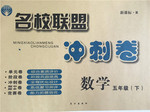题目内容
15.We've all been blamed wrongly sometimes in our lives.How do we deal with it?Not with anger,hurt and tears,but in a collected way…◇If you are wrongly blamed,let others know of the true state of things at once.Do it calmly and clearly-if you lose your temper,people will stop listening or become defensive.
◇If you don't find a sympathetic ear,find a person who will hear you out-a teacher,a parent,a friend,or a brother or sister who believes in you.
◇If you've been in trouble before,it may be easy for people to doubt you.So win your respect back in their eyes by behaving with honesty.
◇If what you are blamed for is something unimportant,sometimes it's better to smile it off.
◇If you've been blamed for something serious,it's important to put your side of the story forward quickly and truthfully.
Just remember:
◇Respect your friends'secret if you don't want to be wrongly blamed for making them known.
◇Don't blame others without first getting proof of their wrong doing.
◇Putting the blame on someone else for what you have done wrong is weakness.Admit your mistake quickly.
◇If someone else is wrongly blamed,stand up for that person.
◇Don't pass the responsibility to others
9.The author of the passage mainly gives us someD.
A.tips on how to apologize
B.ideas on how to get along with others
C.information on how to argue with others
D.advice on what to do when being blamed wrongly
10.The underlined phrase"a sympathetic ear"refers to a person whoB.
A.thinks others are poor B.would like to listen to the truth
C.likes listening to sad storiesD.is impatient when listening
11.What should you do if you are wrongly blamed for something important?A
A.Explain yourself to others at once
B.Don't care much about it.
C.Stop believing in others.
D.Fight back with anger.
12.In order not to be wrongly blamed,you oughtC.
A.not to blame others forever
B.not to give your secret away
C.to take the responsibility of your wrongdoing
D.to find an excuse for your wrongdoing.
分析 在生活中如果被误解了,你会如何应对?文章给出了一些建议.
解答 DBAC
9.D 主旨大意题.根据文章开头We've all been blamed wrongly sometimes in our lives.How do we deal with it?用一个问句说明我们在被误解的时候该如何应对,故答案为D.
10.B 细节题.根据后文的find a person who will hear you out-a teacher,a parent,a friend,or a brother or sister who believes in you.可知,当你被误解时,找一个愿意听事情真相的并且相信你的人,如父母、兄弟姐妹,所以a sympathetic ear指愿意听真相的人,故答案为B.
11.A 细节题.从文章If you've been blamed for something serious,it's important to put your side of the story forward quickly and truthfully得知,当一些重要的事情你被误解时,要立即并且诚恳地向他人解释,故答案为A.
12.C 细节推理.根据最后建议Don't pass the responsibility to others以及Admit your mistake quickly.可知,要及时承认错误并且不要把责任推给他人,故答案为C.
点评 文章考查细节题较多,建议考生在答题时带着问题去文章寻找答案,并注意小标题的作用.

练习册系列答案
 阳光考场单元测试卷系列答案
阳光考场单元测试卷系列答案 名校联盟冲刺卷系列答案
名校联盟冲刺卷系列答案 名校提分一卷通系列答案
名校提分一卷通系列答案 课程达标测试卷闯关100分系列答案
课程达标测试卷闯关100分系列答案
相关题目
10.It is said that there are millions of camels in India and _______ of them is growing.( )
| A. | the number | B. | a great number | C. | a lot | D. | a good many |
7.We must soon ______a new teacher to the class.( )
| A. | adapt | B. | appoint | C. | exchange | D. | abuse |